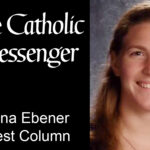
Members of the Vision 20/20 delegation from St. Joseph Parish in DeWitt review their day during the June convocation at St. Ambrose University in Davenport. Some of the DeWitt delegation are, from left, Karen McWilliams, Greg Tigges, Olivia Reyna, Deacon Mark Comer and Sister Janet Heiar, SSND.
By Barb Arland-Fye
The Catholic Messenger
The 450 delegates to the Vision 20/20 Convocation got the message: the people of the Diocese of Davenport need to encounter and accompany others, embrace missionary discipleship and inclusion — all while building a strong relationship with Christ.
This challenging vision and mission require additional resources and guidance. The delegates also made that message clear in reports compiled in an executive summary of the June 6-8 convocation held at St. Ambrose University in Davenport.
Fifty-eight reports were filed in time to be included in the executive summary that Dan Ebener, moderator of the Vision 20/20 Steering Committee, prepared. Diocesan entities that have not submitted reports should do so as soon as possible to provide greater insight about furthering evangelization in the diocese.
Delegates responded to three key questions based on their participation at the convocation: What did they hear? What does it mean for their parish/entity? What help do they need?
Here’s what they heard: Accompany, encounter and engage in missionary discipleship and inclusion. Listen, invite and pray — and then really listen. Exude joy that reflects the joy of encountering Christ. Offer hospitality and invitation. Evangelization is everyone’s responsibility. The Catholic Church has already become a multicultural church. Place less emphasis on rule following and more on the Good News. Don’t expect easy answers; patience is required. The road to Emmaus can provide guidance about the road to evangelization.
Here’s what it means: Listen to, invite and involve youth. Ask the right questions. Learn to tell personal stories of faith. Enhance prayer life. Learn to pray spontaneously. Transform parishes into communities of disciples. Build one-on-one relationships and connections within the parish or other entities. Lay people need to step up; priests cannot do this alone. Engage young adults, families and newly married couples in the parish/entity. Evangelization should be part of faith formation and sacramental preparation. Engage in multicultural conversations and in multi-generational conversations. Develop social media accounts. Revamp new member process. Provide more accompaniment. Circulate the Vision 20/20 Convocation audios and videos. Provide for small group interaction.
Here’s what help is needed: Prayers, the help of Jesus. The movement of the Holy Spirit. Networking with neighboring parishes and deaneries. Diocesan information about the next steps for the Vision 20/20 process. Advice for smaller, rural parishes. Communication skill building and how to hold conversations and to tell faith stories. How to dialogue with other cultures. How to handle the tough questions on topics such as same-sex attraction and sexual misconduct. How to identify lapsed Catholics. Also needed: resources, funding, support from clergy. Goal-setting and how to measure success.
The executive summary reveals that the convocation participants “now understand, or better understand, the meaning and importance of evangelization,” Bishop Thomas Zinkula said. “They are fired up. The general session presentations and breakout talks gave them tools and confidence to step out there and take some risks in sharing the Good News of Jesus Christ.”
“The parish/entity reports were very inspiring. The message of evangelization came through loud and clear,” Ebener said. “Many parishes pointed to the power of prayer and the movement of the Holy Spirit as crucial as we move forward.”
Moving forward
As a result of the convocation, parishes and other entities are now better equipped with ideas for “being” (prayer, Scripture, reflection and liturgy) and for “doing” (reaching out to others), Bishop Zinkula said. “That will help them to attract others to the Catholic Christian faith for the first time, or help them to live that faith more deeply. The reports and the summary also can give parishes ideas of resources, training and other things that they might want to request from the diocese. Likewise, the reports and summary can give the chancery staff a sense of the areas in which parishes can use assistance in their evangelization efforts.”
“Some parishes were very specific about what help they need,” Ebener said. “Others could become much more specific. This will help us prepare for the next phase of Vision 20/20. I was particularly impressed with the number of parishes who expressed an interest in working with neighboring parishes or learning from what other parishes were doing. That type of collaboration will help all of us.”
Bishop Zinkula said that, “while Vision 20/20 definitely needs to keep the focus on the diocese’s many parishes and schools, we also need to keep in mind the special role that religious sisters, hospital chaplains, campus ministers and jail-and-prison ministers can also play in evangelization.”
“The next step for parishes and other entities is to figure out what they want to focus on during the next year. This summer the evangelization teams should be brainstorming avenues for creatively sharing the joy of the Gospel with others,” the bishop said. “However, I have been encouraging them to start slowly so they don’t bite off too much and get discouraged. The diocese is in the process of developing a group of mentors/accompaniers/companions to walk with them and support them on this journey of evangelization at the grassroots level.”
A sample of Vision 20/20 resources
General information about the Vision 20/20 initiative
https://www.davenportdiocese.org/vision-2020
Podcasts of the recorded general sessions speakers and workshops
https://diocese-of-davenport.simplecast.com/











